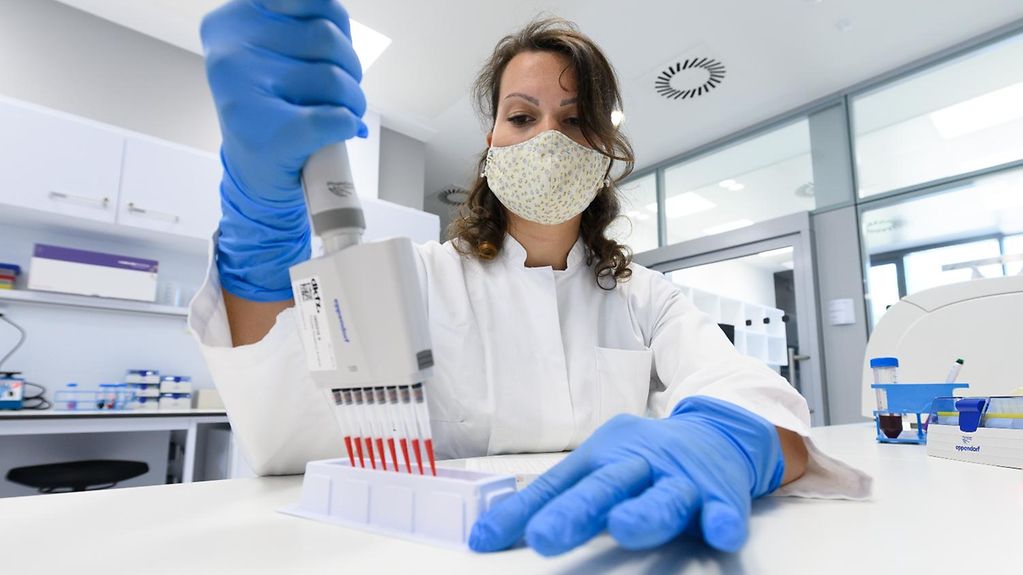World Cancer Day
mRNA technology has massively accelerated the development of COVID-19 vaccines. In fact, the findings originally come from cancer research. To mark World Cancer Day, Federal Research Ministry Anja Karliczek has provided an update on the current status of cancer research and taken stock of progress in the two years since the National Decade Against Cancer was launched.
4 min reading time

The COVID-19 pandemic and the development of new vaccines have turned the public spotlight on mRNA technology. Vaccines based on this technology have been a focus of cancer research for years.
Photo: picture alliance/dpa/dpa-Zentralbild
"COVID-19 and in particular the incredibly fast, successful development of vaccines, was the research story that has dominated the past year. But that doesn’t make the objectives of the National Decade Against Cancer any less important," stressed Federal Research Minister Anja Karliczek at a press conference on Thursday to mark World Cancer Day. "We have actively pushed forward with this work in 2020 too, with our partners and supporters. On the basis of the findings and recommendations of the Decade working groups, we have initiated and realised major initiatives and projects."
"Alongside the existing bases in Heidelberg and Dresden, we are investing in developing the National Centre for Tumour Diseases at four potential new locations so that patients can benefit more swiftly from the achievements of cancer research, without having to travel so far," reported the minister. In future, Berlin, Essen/Cologne, Stuttgart/Tübingen/Ulm and Würzburg with its partners Erlangen, Regensburg and Augsburg are also to be part of the network.
In Germany, about 500,000 people develop cancer every year. By 2030, experts expect the number of new cases to rise to around 600,000 a year. The National Decade Against Cancer brings together all the key actors in Germany’s cancer research landscape in one alliance for the first time. Alongside the Federal Ministry of Education and Research, the German Cancer Research Center (DKFZ) and the German Society of Hematology and Medical Oncology (DGHO), the actors involved include two organisations that represent patients.
Individual cancer immunotherapy thanks to mRNA technology
The COVID-19 pandemic and the development of new vaccines has turned the spotlight on mRNA (messenger ribonucleic acid) technology. mRNA-based vaccines have been a focus of cancer research for years. In future mRNA vaccines are to offer individual cancer immunotherapy.
One of the reasons why COVID-19 vaccines could be developed for market so swiftly was that they could build on the many years of research into mRNA vaccines as a cancer treatment. Individual cancer immunotherapy aims to identify mutations in a tumour, decode their structure and produce a customised vaccine for a specific tumour and a specific patient. The patient’s immune system is encouraged specifically to fight the tumour. "Compared to overcoming immune tolerance to cancer, it is comparatively simple to use a vaccine to activate the immune system to tackle Sars-CoV-2," admitted BioNTech founder Ugur Sahin.
EU launches action plan on cancer
The German government is also stepping up international cooperation in the fight against cancer. "We want to actively address cancer in Europe too," declared Anja Karliczek. "With Portugal and Slovenia, we adopted a declaration to step up European cancer research during Germany’s Presidency of the Council of the European Union, in order to give people everywhere in Europe the same access to the best and most modern care."
The European Commission has now announced a four billion euro plan to beat cancer. The Europe’s Beating Cancer Plan announced on Wednesday in Brussels is to include prevention, enhanced access to screening to ensure early detection, and research into diagnosis and treatment. "Our overarching concern is to provide equal access to modern technology and treatment everywhere in the EU," said European Commission President Ursula von der Leyen.
By 2030 this should ensure that nobody need develop cervical cancer. "We are aiming to eliminate cervical cancer and other cancers caused by human papillomavirus (HPV)," explains the EU’s Health Commissioner Stella Kyriakides. 90 per cent of young women and significantly more men are to be vaccinated against the human papillomavirus (HPV).
Ten million deaths due to cancer in 2020
More and more people are dying of cancer according to the World Health Organization (WHO). In 2020, the number of deaths rose to 10 million, reported the WHO on Tuesday in Geneva. On World Cancer Day on 4 February it was reported that in 2018 around 9.6 million people had not survived the disease. In 2020, 19.3 million people were diagnosed with cancer.
The number of people developing and dying of cancer will rise further over the next few years, stressed André Ilbawi from the WHO’s Department for Management of Noncommunicable Diseases. In the long term, the growing world population and rising life expectancy are the main causes of the further spread of cancer, he stressed.
The WHO estimates that about one third of cancer-related deaths are caused by tobacco consumption, overweight, fruit- and vegetable-deficient diets, a lack of physical activity and alcohol consumption. The COVID-19 pandemic is interrupting cancer treatment in about half of the countries studied, said André Ilbawi. He also pointed to delays in diagnosing cancers, because health service staff are coping with extreme workloads and research is adversely affected.
The WHO underscored the fact that many cancers could be avoided if people changed their lifestyles and avoided high-risk habits. Smoking, for instance, is responsible for a large number of cancer deaths. The World Health Organization also recommended regular screening to ensure early detection.